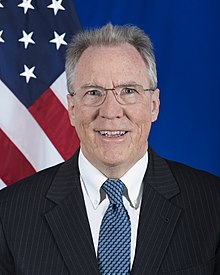
Equatorial Guinea, also rarely known as Equatoguinea, officially the Republic of Equatorial Guinea, is a country on the west coast of Central Africa, with an area of 28,000 square kilometres (11,000 sq mi). Formerly the colony of Spanish Guinea, its post-independence name refers to its location near both the Equator and the Gulf of Guinea. As of 2021, the country had a population of 1,468,777.

The History of Equatorial Guinea is marked by centuries of colonial domination by the Portuguese, British and Spanish colonial empires, and by the local kingdoms.

The Republic of Equatorial Guinea is located in west central Africa. Bioko Island lies about 40 kilometers (24.9 mi) from Cameroon. Annobón Island lies about 595 kilometres (370 mi) southwest of Bioko Island. The larger continental region of Río Muni lies between Cameroon and Gabon on the mainland; it includes the islands of Corisco, Elobey Grande, Elobey Chico, and adjacent islets. The total land area is 28,051 km2 (10,831 sq mi). It has an Exclusive Economic Zone of 303,509 km2 (117,185 sq mi).

The politics of Equatorial Guinea take place in a framework of a presidential republic, whereby the President is both the head of state and head of government. Executive power is exercised by the government. Legislative power is vested in both the government and the Chamber of People's Representatives

Malabo is the capital of Equatorial Guinea and the province of Bioko Norte. It is located on the north coast of the island of Bioko. In 2018, the city had a population of approximately 297,000 inhabitants.

Equatorial Guinea's culture has been less documented than most African countries, and commercial recordings remain scarce.

Equatorial Guinea is divided into two regions and eight provinces. The newest province is Djibloho, created in 2017 with its headquarters at Ciudad de la Paz, the country's future capital.

Spanish Guinea was a set of insular and continental territories controlled by Spain from 1778 in the Gulf of Guinea and on the Bight of Bonny, in Central Africa. It gained independence in 1968 as Equatorial Guinea.

Articles related to Equatorial Guinea include:

SEGESA is the national electricity company of Equatorial Guinea, with its head offices in Malabo, Equatorial Guinea. It is the sole operator of the electricity sector of Equatorial Guinea. The company was created in November 2001 by a merger of the national rural electrification company SONER and the national electricity corporation ENERGE. In 2013 the company was reorganized into three units: SEGESA Comercial for distribution and sales, SEGESA Generación for generation activities and SEGESA Transmisión for transmission. The three units are overseen by SEGESA Holding.
Albert William Sherer Jr. was an American diplomat.
According to Article 3 of the Constitution of Equatorial Guinea, the country is divided for administrative and economic purposes into regions, provinces, districts, and municipalities. In practice, the provinces serve as the first-level administrative divisions. Municipalities are subdivided into village councils and neighbourhood communities. Many of the sub-municipal entities are grouped into urban districts, which remain subordinate to municipalities and are distinct from districts proper.
The Reformed Presbyterian Church of Equatorial Guinea is a minority church in Equatorial Guinea. It is reformed by its theology and presbyterian by its form of government, as stated in its constitution. The principal religion in Equatorial Guinea is Christianity, with approximately 85–93% of the population as followers. Most Christians belong to the Roman Catholic Church (80–87%) while a minority are Protestants (5–7%). Another 5% of the population follow indigenous beliefs, 2% are Muslims, followers of Baha'i and other beliefs.

Equatorial Guinea–Spain relations refers to the diplomatic relations between Equatorial Guinea and Spain. Both nations are members of the Association of Academies of the Spanish Language, Organization of Ibero-American States and the United Nations.

Equatorial Guinea–Mexico relations are the diplomatic relations between the Republic of Equatorial Guinea and the United Mexican States. Both nations are members of the Association of Academies of the Spanish Language, Organization of Ibero-American States and the United Nations.

Equatorial Guinea–Israel relations are the bilateral relations between the Republic of Equatorial Guinea and the State of Israel. The Israeli embassy in Yaounde, Cameroon, is accredited to Equatorial Guinea. Equatorial Guinea has a resident embassy in Israel, which opened in 2019 and located in Herzliya.

David R. Gilmour is an American diplomat who is serving as the United States Ambassador to Equatorial Guinea since 2022.













